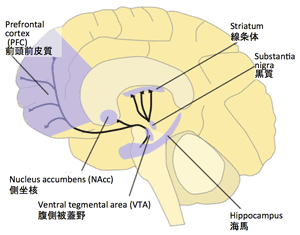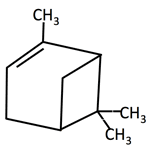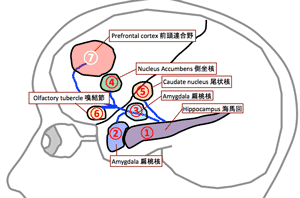>Top 1. Character & Habit of Brain:
- ¶ Is it useful to make efforts?:
- Cause: there is an 'effort gene'.
- Trend: there are two kinds of persons; one who owns effort gene, and the other doesn't.
- The former has genetically has an ability to continue to take efforts, or even feels pleasant to make efforts; consequently the former one can be successful in any kind of examination.
- Impact:
- The present entrance examination (for universities, etc.) mainly measures the ability of memory.
- Advice:
- The one who has not such effort gene should show their abilities in other areas, finding their suitable aptitude.
- ¶ Why Japanese soccer players can not perform active play?:
- Cause:
- It is decided by a particular gene; serotonin is called as a hormone of happiness, which is secreted relatively more in optimistic type of players; while Japanese players usually secrete less.
- >Top Where, 'serotonin transporter' removes serotonin from the synaptic cleft back into the synaptic boutons.
- Average amount of secretion of serotonin: 50% in US &Europe, 30% in Latin America, while 70% in East Asia, and 80% in Japan.
- Trend:
- For most of Japanese players, it is a satisfaction not to fail in playing. They often will not challenge risks in defending and in offending in a game.
- For most of European, or particularly Latin American players, it is a satisfaction to make a success.
- Impact:
- There should be an appropriate method of training depend on the features of brains of the players of a particular country.
- The Japanese have the most worrying temperament in the world.
- As an advantage, the Japanese will eager to practice very much preparing the forthcoming games, to eliminate uneasiness.
- Also the Japanese save money in preparing for the future risk.
- >Top ¶ We have two decision-making methods:
- X-system: refleX-system, decision-making reflectively; this is more quick decision, but not so exact.
- C-system: Calculate-system, decision-making by calculation; this is more exact but takes more time.
- The Japanese tends to select C-system decision-making to adopt more exact and safer decision-making.
- Japanese train operation is quite exact in operation; the Yamanote Line, round trip in about one hour in Tokyo, can accumulate in running roundly in 10 days within only 15 seconds out of the schedule.
- There should be no alternative in decision-making for a forward player in soccer game; if there are plural alternatives it takes more time.
- Cause: >Top 'Dopamine receptor':
- Switch sensitivity to the dopamine receptor varies among people:
- one who is sensitive can respond easily dopamine receptor with small amount.
- the other one who is not sensitive need more stimuli by dopamine receptor; tends to take more challenges to be more satisfactory.
- SA, 40% vs. Asia 5-6% vs. Japan 1%
- SA players challenge too much, Japanese players too less.
- In a case of failure of shooting goal, Japanese spectators will boo regretfully too much, while SA ones will boo not to take challenge.
- In Japan, challenging will not be appreciated.
- Advice:
- to make a routine of 'failure' in daily practices; making failures should be within the scope of assumption.
- >Top ¶ Which is effective 1) Carrot and stick policy, 2) Carrot only policy, or 3) Stick only policy; in making choose the correct route for a mouse; herein Carrot is bait, and Stick is an electric shook.:
- A: Carrot only policy is most effective. A mouse may stop at the crossing to avoid the stick. The best way is 'Carrot or Neglect policy' (Ame or mushi)
- >Top ¶ To reinforce Navigation neuron; relates 'unconscious action'.
- Ability will be enhanced by repeating practices of the same things.
- Even challenging should be routinized.
- ¶ How to do well in the actual game?
- It is rather better to visualize uncertainty or anxiety:
- Write out and accept the anxiety or the cases of failure.
- Rather than compressing or concealing the anxiety.
- Astronauts receive trainings which look like real emergent cases; then they can respond to the emergency just like the case of trainings.
- ¶ Efforts are needless to succeed?
- Here it is actually 'wasted efforts.'
- One who had endeavored to realize some unattainable goal, the one could gain nothing but regret or resentment, if failed.
- You should think that the process of endeavoring is really meaningful, or what do you want to attain, analyzing calmly and objectively your potentiality.
- Consider case of an Olympic athlete who aimed to get the gold medal resulted in the bronze medal; the athlete has spent meaningful times for hard training for the beloved sport, accepting the process is more valuable than the result of the match.
- It is important to set up the really probable or realistic goal for the athlete or any other challenger from more reasonable and rational decision.
- Continuing to exert oneself for less possible goal may cause to be exploited by some malicious magical group, a religious cult, sweatshops or fraud group; they surely require more donation to attain the unrealistic and unattainable goal.
- ¶ The advice of 'efforts will be rewarded' is half-true; it is a beautiful lie.
- It should be restated that 'make efforts which could be rewarded.'
- Human ability is determined by own gene to a certain extent, which could be difficult to change it.
- It is rational to ascertain the possibility or the limit of one's own ability; to find the goal within one's reach, which should be the real ability.
- There are actions which one can do or cannot.
- Human beings have assigned the latter to some others who can do it, for which we have developed communication ability.
- >Top ¶ The Japanese tend to addict oneself to exerting anything, due to lack of serotonin.
- Serotonin is thought to be a contributor to feelings of happiness.
- Serotonin is synthesized via tryptophan, an essential amino acid; meat and banana are good food to increase such amino acid.
- In order to live long, it is a good strategy not to fight.
- Samurai loads who avoided to fight in feudal age generally live long, like Tokugawa Ieyasu (75) , Shimazu Yoshihisa (79), and Takeda Nobutora (81), Ukita Hideie (84).
- The object of most of the animals is to live long and to have more descendants; human beings look exceptions, trying to make a name for oneself.
|
1. 脳の性格や癖:
- ¶: 成功する努力は有効か:
- Studying (or to concentrate to study) is apriori, but art is posteriori.
- ¶ 日本のサッカーチームの弱点
- Serotonin:
5-hydroxytryptamine (5-HT);
monoamine neurotransmitter.
- a contributor to feelings of well-being and happiness.
- controller of dopamine and noradrenaline.
- ¶ 毎日がつまらない
- 飽きた状態=実は幸せな場所
- 慣れた環境で効率的
- Dopamine分泌を促進:
新しい刺激・趣味を持つ
- 運の良い人の行動パターン
- Dopamine Pass:

- ¶ 2つの意思決定方法:
- X-システム: 情動的
爽快感で意思決定
- C-システム: 理性的
長期的な視点から選択
- ドーパミン受容体:
- Dopamine: functions as a neurotransmiter; major role in reward-motivated behavior.
- 地域・民族による差異
- 日本人は特異的
- 気質の種類:
- 新規性探索: Dopamine
- 損害回避: Serotonin
- 報酬イオン: Noradrenaline
- 固執
- ¶ アメのムチはどちらが効果的か:
- ¶ ナビゲーション・ニューロン:
- ¶ 本番で力量を発揮するには:
- 不安や心配を見える化する
- 心配事を抑圧・隠蔽しない。
- 宇宙飛行士は緊急時の訓練を本番同様に行う。その結果、緊急時にも訓練同様の対応が可能。
- バンドワゴン交換
- 脳の酸素消費は全体の 1/4
なので脳自身楽したい
- 思考停止
- 並んでいる店に並ぶ傾向
- ¶ 成功するための努力は必要なにか。
- 実際には無駄な努力はすべきでない。
- 達成不可能な目標に向かって努力するのは、失敗した後の後悔しか残らない。
- 意味のある努力をすべきで、それを見つけること自体が能力。
- ¶ "努力が必ず報われる"は、半分正しいが、美しい嘘。
- むしろ報われる努力をすべし
- 人の能力はある程度は遺伝子による。
- 自分の能力の限界を見極めることが合理的。
- ¶ 日本人は、努力中毒の傾向。セロトニン不足。
- セロトニンの増加には、必須アミノ酸トリプトファンが必要
- 長寿の戦略には闘わない戦略が有効。
- 戦国大名も闘わない大名が長寿
- 生命の基本戦略: 生存と生殖
|


